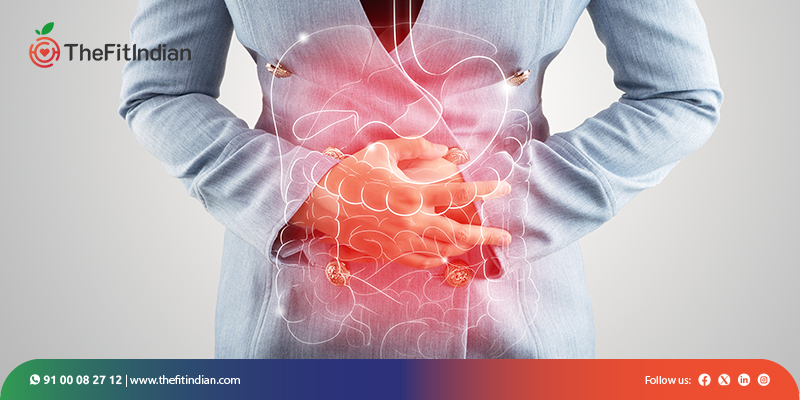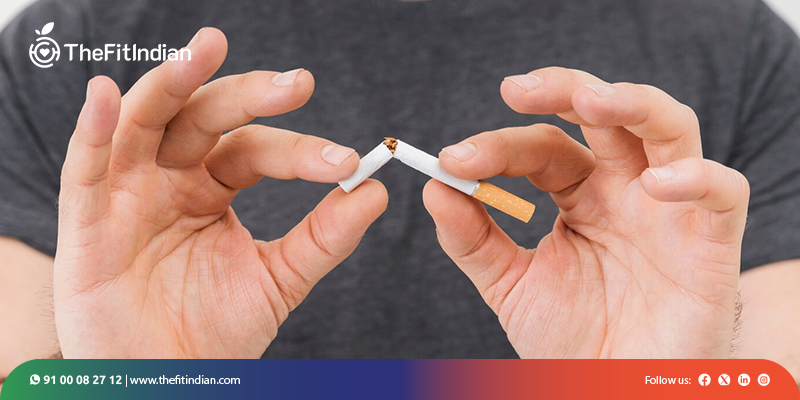GERD and Lifestyle Modification – A Complete Guide
Reviewed by: Dr. T S Deepthi Sarojini | Author: Manoja Kalakanti

How often do you experience heartburn or a fiery feeling in your chest? If your answer is quite often, then you are in trouble. Under normal conditions, heartburn might occur once or twice, possibly because of acidity, but once the frequency increases, you need to rush and see a doctor. Gastroesophageal reflux disease, or GERD, is a common condition that pushes stomach content into the esophagus. Frequent refluxes can easily damage the esophagus, pharynx, or respiratory tract. GERD is not fatal, but having your organs mentioned above damaged is not a great way of living. Ignoring the early symptoms is, therefore, non-negotiable. But, here’s good news – you can actually cure yourself from the disease by observing a subtle lifestyle modification. Living a GERD lifestyle, as doctors would recommend, is your best bet.
How do You Define a GERD Lifestyle?
It is essential to sharpen your knowledge about the disease to understand lifestyle modifications for GERD.
GERD, or gastroesophageal reflux disease, is a digestive ailment triggering stomach acid and bile to irritate the food pipe. Termed chronic, GERD can severely damage specific organs when the symptoms are prolonged and untreated. Primary symptoms include:
- Fiery feeling in the chest
- Regurgitating sour liquid to the throat or mouth
- Non-burning chest pain
- Chest pain radiating to the back
- Dysphagia, or troubled swallowing
- Atypical reflux symptoms relating to the throat, larynx or lungs:
- Sore throat
- Coughing
- Increased salivation
- Shortness of breath
The primary signs of reflux and heartburn are enough to kickstart treatment and medication. But contracting GERD disease doesn’t necessarily mean you are bound to a restricted routine. Besides medications, there are other ways to alleviate the symptoms and increase your chances of normalcy. The holistic approach is what dieticians would call, embracing a GERD lifestyle. This change will give you better control over the symptoms in the long term.
Can GERD be Cured with Lifestyle Changes?
Absolutely. GERD is curable, as mentioned before, and requires a curated combination of medications and GERD lifestyle changes. For optimum results through medication, it is always preferred to trust the expertise of a certified doctor. However, the following lifestyle modification tips will give you a head start before the treatment begins.
Healthy Tips on Lifestyle and Modification for GERD
Since the disease is centered around your digestive system, a lifestyle change would indicate controlling what you put in your body. Here are a few suggested tips by experts to follow as a typical GERD lifestyle chart:
Choose Smaller Portions

You need not fill your stomach to the brim when eating. Leave some spare space for the food to get easily ingested by your organs. Eating smaller meals can result in a less filled stomach, leading to a decrease in the production of stomach acid and a subsequent reduction in gastric pressure. A distended stomach exerts physical pressure on the lower esophageal sphincter (LES), the valve between the stomach and esophagus, facilitating the escape of more gastric acid into the esophagus. And this condition is what science says is GERD.
One small tip: Break down your three larger meals into six smaller ones to give your body the daily nutritional dose required.
Eat Slowly

Do not simply gulp down your meal unless you are catching a flight in five. Take time to chew every morsel and allow your body enough bandwidth to accept the food.
When you consume food, the stomach sends chemical signals to the brain, indicating the presence of food. Once the stomach is complete, the brain generates feelings of satiety, simply feeling full and satisfied.
However, these signals may take up to 15 minutes to travel from the stomach to the brain. Eating quickly increases the likelihood of overfilling the stomach before the brain receives these messenger signals. Conversely, by adopting a slower eating pace, your brain can synchronize with your stomach, notifying you when it is full.
Follow the simple eating rules:
- Take your meals at a table
- Avoid watching TV or sitting at the computer while eating
- Put down your fork or spoon between bites
- Try eating while conversing
- Eat with your hands
No Meal Before Bedtime

Binge-watch with late-night snacking is highly tempting, an unspoken reality of today’s generation. Sadly, the late-night titbits can do anything but good.
Indulging in late-night snacks is not advisable for individuals with GERD. When you recline after eating, gravity compels the stomach contents closer to the LES (located near the upper part of the stomach). Consuming a substantial amount of food exacerbates the pressure against the LES.
To mitigate this, refrain from eating or drinking within two hours of bedtime, and if GERD symptoms are severe, consider extending the period to four hours before sleep.
Keep Your Head Elevated

Precisely while sleeping! The elevation allows gravity to decrease pressure against the LES and prevent the stomach’s contents from refluxing into the esophagus.
Doctors usually recommend stiffer pillows at an elevated height for a reason you just discovered. Otherwise, you can place bricks or blocks under the legs at the head of your bed, which can naturally increase the height. That saves you from a few extra pillows. The same approach should be applied while you are napping. Most people find napping in a chair blissful because the chances of heartburn or reflux are less comparatively.
Avoid Trigger Foods

Food triggering heartburn, like alcohol, is problematic. They increase stomach acid production and allow acid to reflux into the esophagus. Spicy foods, citrus fruits, coffee, and juices tend to irritate the lining of the esophagus directly and set GERD in motion.
Tracking each meal and identifying foods triggering heartburn is necessary to prevent a repeat occurrence.
Use Antacids Carefully

Antacids can effectively address acute heartburn yet using them indiscriminately at the slightest hint of discomfort may lead to adverse effects. Excessive use of antacids can result in constipation, diarrhea, alterations in stool color, and stomach cramps. Those containing calcium may contribute to the formation of kidney stones. Furthermore, antacids may interact with certain medications, including HIV drugs, thyroid hormones, and blood thinners such as Coumadin (warfarin). To prevent interactions, it may be necessary to take an antacid two to four hours before or after specific medications.
Destress Yourself

Stress has the potential to exacerbate GERD symptoms. It doesn’t necessarily “cause” GERD but rather amplifies the perception of symptoms.
During periods of stress, individuals become more attuned to reflux symptoms, leading to the misconception that stress is the primary trigger. Taking a moment to pause, practice deep breathing, and relaxation can help alleviate the anxiety often associated with acute GERD episodes, resulting in a quicker relief of symptoms.
Additionally, integrating daily stress management practices can serve as a proactive measure, mitigating stress levels consistently. Some beneficial practices would be controlled breathing, meditation, progressive muscle relaxation and a few others.
Quit Smoking

Smoking is injurious to your health. But if you are a chronic GERD patient, that’s the worst habit one could have. Smoking ranks among the most detrimental habits for individuals with GERD. Cigarette smoke not only irritates the esophagus but also stimulates increased stomach acid production by causing inflammation in the stomach lining.
Moreover, smoking hampers digestion prolongs the retention of food in the stomach, and diminishes saliva production, which is essential for neutralizing stomach acids. Over time, it can also reduce the overall tone of the lower esophageal sphincter (LES)
Avoid Tight Clothes

Wearing tight clothing around the waist can exert pressure on the stomach, causing food to move upward toward the LES. While these garments may enhance your appearance by creating a slimmer look, they also raise the risk of acid reflux, even for individuals without GERD. Preferably, steer clear of snug belts, body-shaping undergarments, slim-fit yoga pants, and tight trousers if you experience GERD. Opt for loose-fitting attire, untucked shirts, and suspenders instead of belts to promote better comfort and reduce the likelihood of acid reflux.
What Causes GERD – Lifestyle-Inducing Factors
A sedentary lifestyle causes GERD or at least increases the possibility of developing the early signs. And food has a substantial role to play. Poor lifestyle, bad eating habits, and unhealthy diet make a deadly combination, giving rise to several ailments, including the one talked about. It has been pointed out that fatty, fried, sour, spicy food/products, orange and grapefruit juice, tomatoes and tomato preserves, chocolate, coffee/tea, carbonated beverages, and alcohol trigger GERD symptoms. Primarily, these items induce frequent acid reflux or reflux of nonacidic content from the stomach, which weakens the sphincter around the bottom of the esophagus, allowing a constant backwash of acid to irritate the lining of your esophagus and inflame. Apart from this, there are certain health conditions responsible for increasing GERD, such as:
- Obesity
- Hiatal Hernia
- Pregnancy
- Delayed Stomach Emptying
- Connective Tissue Disorders
In the absence of a healthy lifestyle modification for GERD, complications might arise with time, leading to chronic inflammation in your esophagus, apparently resulting in the subsequent ailments:
- Inflammation of the tissue
- Narrowing of the esophageal structure
- Barrett esophagus, or precancerous changes
That being said, subtle alterations in your lifestyle can prevent certain underlying health conditions like obesity from becoming severe and triggering GERD.
Tips to Control Health Factors Causing GERD
Lifestyle changes for GERD not only cover the tips mentioned above but a few more factors preventing underlying health conditions, such as:
- Maintaining a healthy body weight within the range of a body mass index (BMI) between 18.5 and 25
- Abstaining from smoking
- Engaging in moderate to vigorous physical activity for a minimum of 30 minutes each day
- Limiting daily consumption of coffee, tea, or soda to no more than two cups
- Adhering to a nutritious diet is characterized by a higher intake of fruits, vegetables, whole grains, legumes, poultry, and fish
The Final Takeaway
As stated earlier, GERD is a curable and preventable disease. But becoming susceptible to the inducing factors is just as easy. Giving yourself to temptations like late-night snacks is an avoidable choice only when you discipline your body to a healthy routine and respect the natural sleep-wake cycle. To prevent GERD, lifestyle modifications are necessary if you wish to retain sound health. The above-mentioned tips are strongly recommended alongside expert consultation to curb the severity of the symptoms and other related health issues.
FAQ’S
NYU Langone advises lifestyle changes to ease GERD symptoms, preventing esophageal damage. For mild cases, these changes alone may relieve discomfort.
Reflux-triggering foods include:
Fatty and fried foods
Spicy foods
Citrus fruits
Tomato ketchup and vinegar
Chocolate
Caffeine
Carbonated beverages
Alcohol
Peppermint
GERD symptoms like coughing worsen when lying down. Acid reflux reaching the throat and larynx causes coughing or choking during sleep
Sleeping positions can induce acid reflux; therefore, adjusting them accordingly is advisable. Typically, sleeping on your left side is recommended to reduce reflux episodes.
Big meals expand the stomach, hindering sphincter closure. This allows stomach contents to wash back into the esophagus, causing reflux.
Loose clothes to alleviate stomach pressure, reducing the likelihood of worsening heartburn and reflux.
Smoking heightens stomach acid production and weakens the lower esophageal sphincter, allowing acid to reenter the esophagus.
Weight loss reduces abdominal fat, easing pressure on the stomach and gastroesophageal sphincter, potentially alleviating discomfort.
NYU Langone provides hypnosis for smoking cessation, including a 45-minute counseling session with follow-ups or telephone counseling as necessary.
Lifestyle changes for GERD treatment include:
Weight loss
Quitting smoking
Avoiding late meals
Elevating the head of the bed
Reducing alcohol intake




Manoja Kalakanti